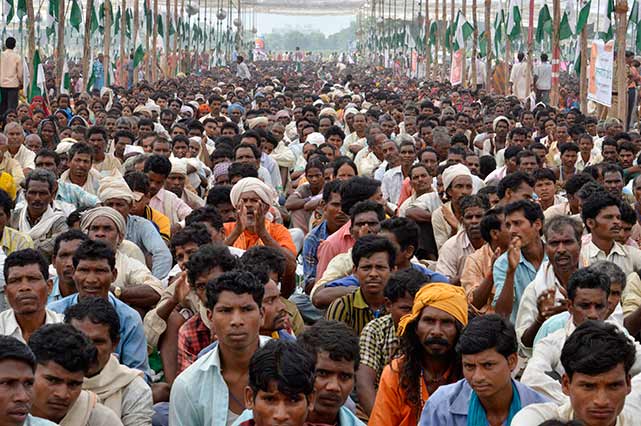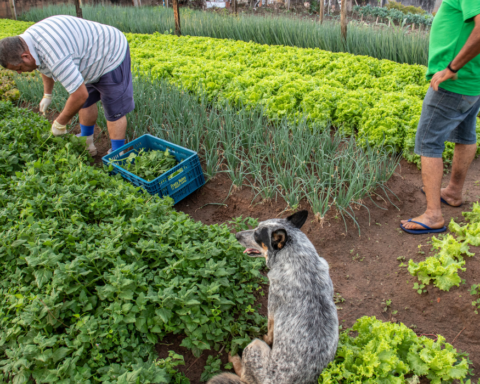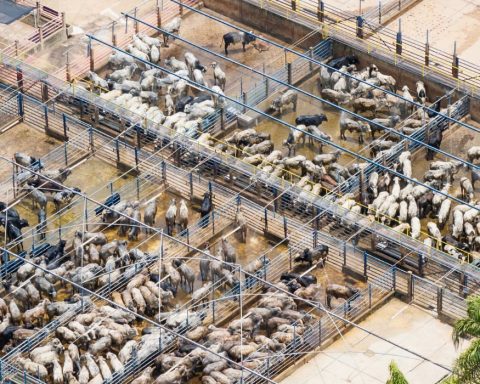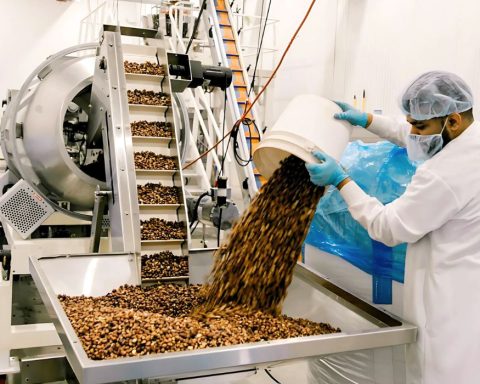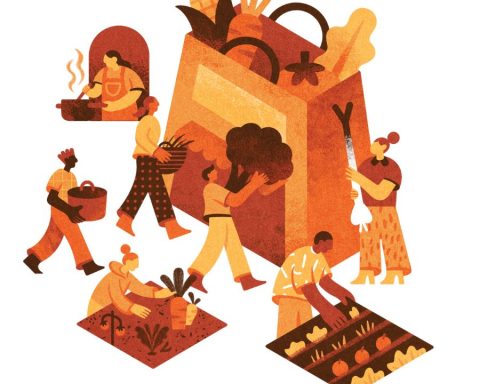Dr. Vandana Shiva is a force. In a single breath, she takes down patriarchy, industrial farming, nuclear power and corporate culture. She is able to draw out our collective anxieties and assign blame in a way that feels almost cathartic. Her message, poignant as ever, was clearly working on the crowd in Toronto last Saturday, as the audience alternated between silence, applause, muttering in agreement and standing in ovation.
Shiva holds a bachelors degree in physics and a masters degree and PhD in the philosophical foundations of quantum mechanics. After leaving her career in science in 1987, she founded a network of seed keepers and organic producers called Navdanya. In 1993, the network a central role in organizing a protest that brought together 500,000 farmers to challenge the General Agreement on Tariffs and Trade, the precursor to the World Trade Organization.
 That same year, Shiva received the Right Livelihood Award, sometimes referred to as the alternative Nobel Prize, for her role in placing women and the environment at the center of the international development debate. In 2010, she received the Sydney Peace Prize for her social justice work. Time, the Guardian, Forbes and Asia Week have all named her among the world’s most important activists.
That same year, Shiva received the Right Livelihood Award, sometimes referred to as the alternative Nobel Prize, for her role in placing women and the environment at the center of the international development debate. In 2010, she received the Sydney Peace Prize for her social justice work. Time, the Guardian, Forbes and Asia Week have all named her among the world’s most important activists.
These days, Shiva travels the world speaking about genetically modified (GM) food and the dangers of industrial agriculture. Or more positively, she advocates for organic, small-scale, fair trade farming.
Her views, never sugar-coated, tend to elicit strong feelings from people wherever she goes. A profile of Shiva in The New Yorker earlier this year highlighted the controversy of her public persona. GMO science is hotly contested to begin with. But some of Shiva’s foundational arguments also have holes in them, such as farmer suicide rates in India are rising with the use of Monsanto’s Bt cotton.
Mark Lynas, an anti-GMO activist turned pro-GMO advocate, said in the New Yorker article that he doesn’t think Shiva is lying on purpose. “But she is blinded by her ideology and her political beliefs. That is why she is so effective and so dangerous.”
Corporate Knights’ managing editor Jeremy Runnalls caught up with Lynas the same week as the New Yorker did. Runnalls asked him about his transformation from GMO opponent to supporter, and what a future with GMOs might look like.
Lynas and Shiva are firmly established on either side of a debate that is complicated not only by science, but is also wrapped up in politics, beliefs about nature and personal tastes for food. Nathanael Johnson for Grist perfectly positions Shiva’s message in the global discussion on GMOs and the environment more broadly: “Romantic environmentalists tend to get the big-picture problems right, while fudging the details. Rationalists nail the details, but sometimes become so immersed in the minutiae that they lose sight of the big picture.”
I found myself questioning some of the evidence in Shiva’s talk. But I also found myself nodding along with the crowd at her big-picture statements, feeling like I always do when someone nails complex issues so squarely on the head.
With that in mind, I sat down with Shiva in Toronto to get her perspective on business, trade and, of course, GMOs. What follows is an edited discussion between Shiva, Mariah Barrett and me.
BARRETT: Is there any hope for business? You talked about the health of the planet and making money as being interconnected. Do you think that there is a chance that if corporations start diverting their money away from GMOs and toxic agrochemicals and investing in all of the amazing ideas that you talked about in your speech, that they could create something better?
SHIVA: First, I separate businesses from corporations. Of course there’s a role for small business in the food system. Organic farmers by themselves cannot make the change; they need partnerships with small business. We also have a need for ecologically and socially responsible investment that doesn’t turn farmers into raw material producers for a poisonous industry. I watch farmers get into debt for growing cheap potatoes for Pepsi, so Lay’s chips. That’s not the kind of investment that will defend our health or our planet.
So, definitely, we need new partnerships. But they have to be based on a common commitment to the protection of the Earth, not as empty commitments to sustainability. I increasingly believe we need biodiversity of economies just as much as we need biodiversity of ecologies. The monoculture economy of five monopolies in every sector is what has become the threat. We need pluralism in the business sector.
RENDERS: Shiv Chopra said in his speech earlier tonight that food should not be traded. Do you agree with him?
SHIVA: When Shiv was talking about how food should not be traded, I think he was talking about the trade rules being set by corporations for international trade. Food and agriculture are too vital to life to be left to free trade agreements written by corporations. Localized systems generate more jobs, create better food and create more resilience – at every level, they’re better. That doesn’t mean you don’t trade in anything, otherwise you would have absolutely no spices from India, you wouldn’t get coffee from the coffee-growing areas. So, the principle is: only trade in that which you cannot grow locally and build local economies in that which you can.
And in international trade, don’t leave it to corporations to push farmers to distress and serve you bad, toxic food. Instead, make it fair trade, so that it’s fair at every level: fair to the Earth, fair to the producer, fair to the consumer. You know, I would even give them their profits if they could bring us better food. But they fail in the test of healthy food, they fail in the test of sustainability and they fail in the test of fairness and justice. Those are the criteria that any food system should go through.
RENDERS: The Canadian government recently finished up a consultation on a low-level presence policy that would allow low levels of non-approved GMOs to enter the country in grain shipments from other countries, as long as they’re approved by a scientific body in that country. So basically, Agriculture and Agri-food Canada is saying if the U.S. or another country has approved a GMO, then it should be okay for Canadians to eat in low levels. The Canadian government is also trying to make this an international standard that would be accepted by 15 other countries. This is a trade-based policy, not a health- or food-based policy. I’m wondering if you know about it and if you could comment on it.
SHIVA: I don’t know about this particular policy, but I do know that the attempts of the Canada-Europe free trade agreement, as well as the Transatlantic Trade and Investment Partnership, is to give a push to GMOs, in Europe particularly. Just two days ago, fortunately, the European parliament gave a very strict vote on GMOs.
The word across the world is, nobody wants GMOs. Europe doesn’t want it, Russia doesn’t want it, China doesn’t want it. In my own country [India], they try and push, but we use our democratic and legal systems to push back. Until today, they haven’t managed to plant any GM food crops. The more corporations try to push through so-called free trade agreements – where free trade means our right to bully you to eat GMOs – the more the movement will grow. Corporations are still working under the assumption that only they talk to governments. But in democracies, people are also supposed to talk to their governments.
BARRETT: You mentioned that fair trade is better at developing communities and brings 10 times more returns. Do you think that changing the way corporations perceive their profit models can actually change the corporation?
SHIVA: Elephants live in herds, but some elephants become rogue and leave the herd and then they become destructive. Some corporations have become like the rogue elephant; they are rogue corporations. Some could be brought back into the herd of the human community, but some will just have to go. If there’s no place for poisons in our food, then poison-makers have to go. There is no “half poison.” So, I think businesses need to change, and the business model needs to change.
It is also weird that corporate personhood is being used against real people and real people’s rights that are enshrined in constitutions. So there’s a change happening on both sides: a worse perversion against democracy, sustainability and justice by some corporations, and a search for shared values by others. And we hope the groups that are searching for shared values and the protection of people’s health are the ones that will be able to reshape the business empire.
The Q&A portion of this article was written with files from Mariah Barrett, who is the chief executive officer of Barrett Ray, an impact investment firm and consultancy group that helps businesses realize their community impact and profit potential through the creation of shared value. Follow her on Twitter @MariahBarrettTV. This article was updated on November 21, 2014.


